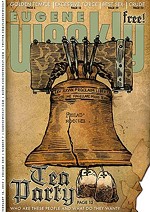Did FBI Foil Its FBI Bomb Plot?
Did the FBI foil a teenager’s terrorist bomb plot at the Portland Christmas tree lighting last Friday, or did the federal agents who contacted, trained, funded, equipped and directed the teen to press the button on the bomb they built and placed for him simply foil their own sophisticated “bomb” plot and then hype it in the media?
That question may be left for a jury to decide, if an impartial jury can be found after a weekend of FBI-fed wall-to-wall coverage of the “terrorist.” On Monday, the 19-year-old Mohamed Mohamud finally got an attorney who promptly accused the FBI of “entrapment” and said government agents were “grooming” his client for the attack and orchestrated his arrest with a “press release” affidavit that was “timed for maximum publicity.”
The FBI fervently denies that its operation meets the legal definition of entrapment or that it has sought to try the case in the media.
But the gray area of how far the government can go in entrapping citizens in crimes has raised legal, ethical and public policy debate for decades. Can the government entrap liberals who download rock songs illegally? Can it entrap Tea Party activists attracted by easy tax evasion? Would an FBI agent put in for “foolproof” illegal overtime? How about testing if conservative Christians would press a remote “bomb” button on an abortion clinic?
The FBI has long known that it must tread carefully in entrapping citizens. After the U.S. Supreme Court threw out a federal case for entrapment in 1992, the FBI circulated legal advice in its FBI Law Enforcement Bulletin in April 1993.
“The most convincing evidence of predisposition will typically occur during the initial government contacts, which officers should carefully document to successfully defeat the entrapment defense,” the FBI bulletin wrote.
In the Portland case, the FBI claims that it lost the recording of its initial meeting with Mohamud due to a technical problem. The FBI did not explain in the 36-page affidavit it sent to the media how it failed to carefully document the key initial meeting by at least having a small backup recorder, widely available in stores for only a few dollars.
The bulletin also states that agents should avoid using “persistent” techniques in an operation. According to the FBI, federal agents persisted in pursuing Mohamud for six months.
Lack of prior criminal activity can also figure in entrapment cases, according to the bulletin. Mohamud lacked a criminal record, but police released documents to the media with an anonymous allegation of date rape at OSU.
The FBI bulletin notes an entrapment case the government lost due to “outrageous” unconstitutional conduct, when agents supplied and built and did the bulk of the manufacturing and provided the expertise for a laboratory creating illegal drugs. The FBI did most of the manufacturing and provided the expertise and funding and equipment for the building of the Portland dummy bomb, according to the FBI.
But other tests in the FBI bulletin appear to fit the FBI’s allegations against Mohamud that he was not reluctant to kill families gathered at the Christmas tree lighting. In many ways, the federal government has wide discretion in choosing which citizens to entrap, according to the FBI. The 1993 bulletin states that one of the few limits on FBI entrapment is “limited resources.”
The Oregon FBI appears to have nearly unlimited resources to pursue cases it chooses to label “terrorism.” During the Bush administration the FBI deployed dozens of agents for years to pursue acts of property damage by environmental radicals.
In the end, the public may never know whether a teenager would have really tried to kill all those people without the FBI helping. In the face of life sentences, many such terrorism suspects take plea bargains and never go before a jury.







